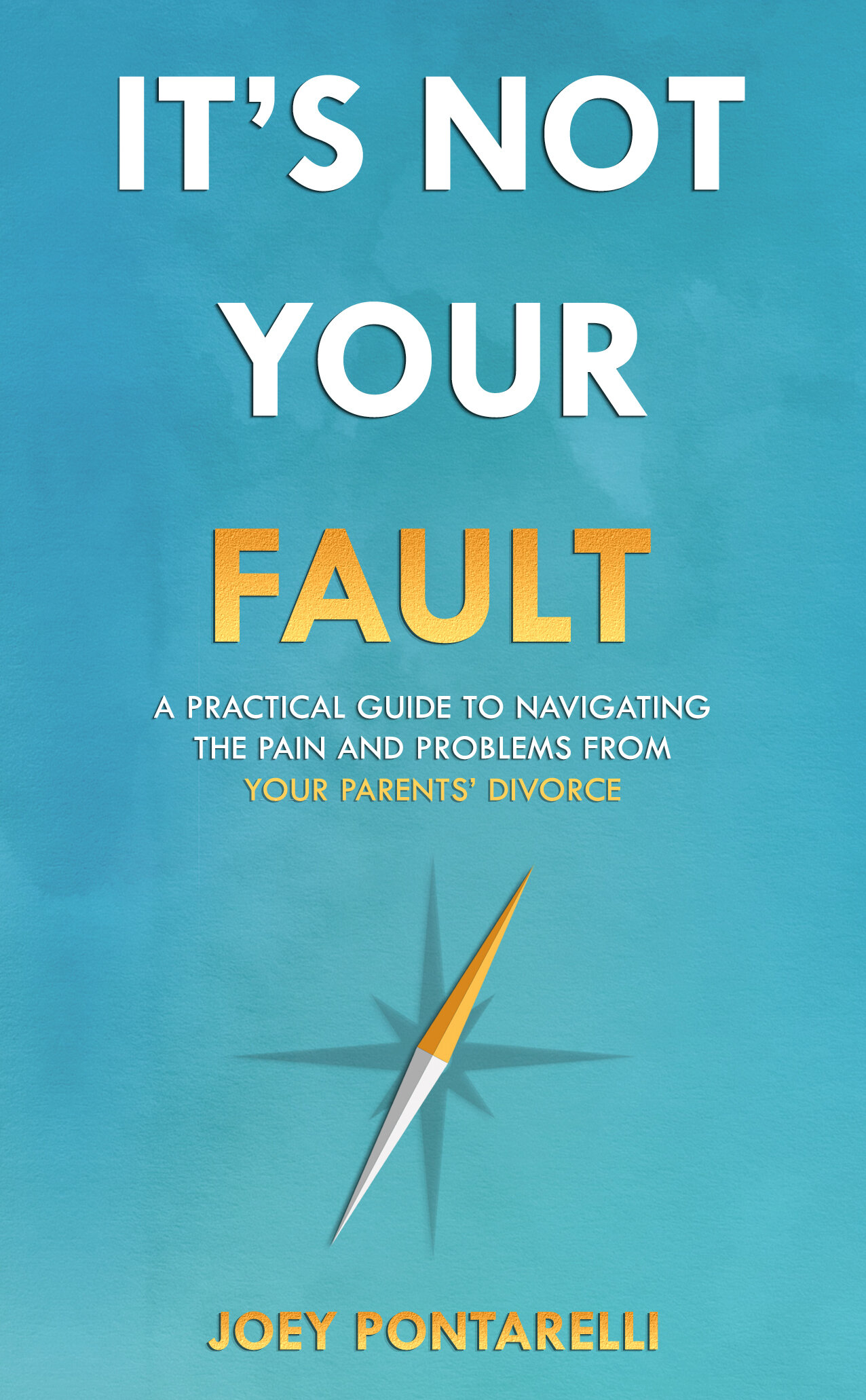How Can I Cope in Healthy Ways Instead of Unhealthy Ways?
4 minute read.
As we recently revealed here on the blog, our new book, It’s Not Your Fault: A Practical Guide to Navigating the Pain and Problems from Your Parents’ Divorce, is live on Amazon!
We’re so confident this resource will be invaluable to teens and young adults from broken homes, as it shares practical advice on so many of the struggles that they face as a result of their parents’ divorce or separation.
Some of the struggles addressed include facing anxiety and depression, experiencing fear of love and relationships, developing an aversion to conflict, and more.
Today we share question 14 from the book regarding healthy ways of coping. We really hope this is helpful to you or someone you know from a broken home and that you will consider getting the first chapters FREE today!
How can I cope in healthy ways instead of unhealthy ways?
After my parents separated, I acted out. I became bitter, angry, anxious, and depressed. In an attempt to numb the pain, I turned to pleasure. A friend introduced me to pornography. Immediately, I felt amazed yet ashamed at what I saw. It quickly led to a habit that offered an escape from the pain and problems in my life.
Though it offered a distraction, I noticed that in the moment it felt so good, but afterward I just felt so empty. Even at a young age, I knew I wanted to be happy. Porn wasn’t making me happy, so I needed to change.
The most immediate thing that helped was getting new friends, which is easier said than done. I realized my sports buddies weren’t good for me. Luckily, I met new friends who were genuinely happy. Whatever they had, I wanted it. I discovered that the source of their joy was their faith. They were devout Catholics. In an attempt to be like them, I began to learn my faith, develop intimacy with God through prayer and the Sacraments, and even build virtue in my life. The people you surround yourself with are very important. I love the quote, “You can’t change the people around you, but you can change the people around you.”
Even with good friends, life is full of stress, intense emotions, and difficult situations. When you experience those difficult things, you react instinctively. That’s the definition of coping. Automatically, you usually turn to unhealthy things or use good things excessively. Why? It’s simple. When you feel bad, you want to feel good — even if it hurts you in the long run. You want the momentary relief — a distraction, an escape, a way to bury your feelings or the reality of the situation.
The first solution to unhealthy coping is developing “emotional agility.” In her book, Emotional Agility, Harvard psychologist Dr. Susan David explains that emotional agility has two parts: 1) The ability to face and feel your emotions, and 2) Choosing a response in a way that aligns with your deepest held beliefs. How do you develop emotional agility? Dr. David gives a few tips.
First, she says to create a space between stimulus and response. As quoted before, psychiatrist Viktor Frankl said, “Between stimulus and response, there is a space. In that space is our power to choose our response. In our response lies our growth and our freedom.” In other words, if you want freedom and growth, you need self-mastery. To do so, simply lengthen the space between when you feel something and when you respond. In that space, build discipline to choose what is good and healthy for you instead of what is harmful.
Second, she says to remember that you are not your thoughts. You are not your feelings. You have thoughts. You have feelings. But you are not them and they are not you. They describe how you’re doing, not who you are. And they certainly don’t control you. With practice, you can learn to control your response to those emotions so they don't own you.
Third, she suggests labeling your emotions. She shares a story about a client named Thomas, who was a business executive. Upon arriving to the office one day, he had a seizure. The paramedics took him to the hospital. After running tests, the doctors had good news: It was extremely unlikely for Thomas to have another seizure. But he wouldn’t listen. Thomas became so obsessed with the fear of having another seizure that he lost his job, his wife, and even his home.
Years later, he was living on the streets when Dr. Susan met with him in therapy. She noticed that when asked how things were going, he would almost always reply with “fine.” One day, she asked him about his mother. She had been there for him when everyone else abandoned him. When Dr. David asked him how things were going with his mom, Thomas just replied, “Fine. She died.” Dr. David was blown away. At that moment, she realized that Thomas suffered from a condition called alexithymia, the inability to identify and put emotions into words. As a result, he continued to struggle and feel stuck in life.
To avoid getting stuck emotionally, Dr. David advises to first learn to recognize your emotions. When you feel angry, acknowledge it to yourself. Then, put your emotions into words by writing or speaking about them with someone else. Describe them in as much detail as possible. That alone is extremely helpful in avoiding unhealthy coping that you’ll later regret.
Similarly, allow yourself to feel your feelings. Don’t bury them. Don’t ignore them. Face them. Instead of running from them, sit with those messy and uncomfortable feelings. If you ignore them, they tend to be prolonged. Like a weed that isn’t pulled by its root, they’ll keep sprouting up.
When trying to stop unhealthy coping behaviors, remember there are three parts to a habit: 1) The cue or trigger, 2) the routine or behavior, and 3) the reward. Eating fast food is a good example of how the three parts work. When you feel hungry you experience the cue or trigger. Going to get food at a fast food restaurant and eating that food is the routine or behavior. The reward is the pleasure from tasting the food, the feeling of being full, and the nutrients that your body gets.
To change a bad habit, it’s almost impossible to stop cold turkey. The neural pathway has already been carved into your brain. As a result, you still experience the trigger (e.g. hunger) and you still desire the reward (e.g. tasty food, feeling full, etc). To change, you have to substitute the routine or behavior with a better action that offers a similar reward. To stop eating unhealthy fast food, for example, you need to substitute that behavior with eating healthy food that offers a similar reward — it tastes good, you feel full, and your body gets the nutrients it needs.
Also, don’t get discouraged when you relapse. It happens. Since your brain is so accustomed to that behavior, it’s easy to fall back into old ways. Get yourself back up and begin again like you never fell. Discouragement destroys progress more than mistakes do.
For more practical ideas on coping in healthy instead of unhealthy ways, see the bonus material when you purchase It’s Not Your Fault.
Thank you for reading. Buy the book or get the first chapters FREE today. The book includes bonus material that gives you even more in-depth guidance about healthy coping and ideas on how to do so.
Here’s to undoing the cycle of dysfunction and divorce, one person at a time.

